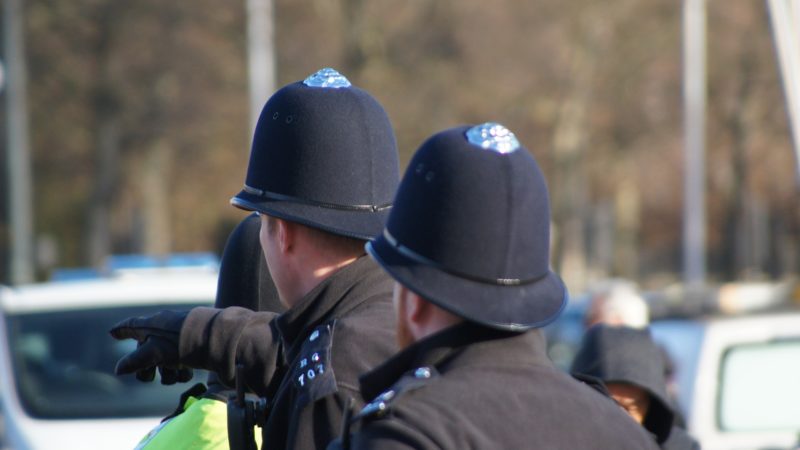
“We need to come down hard on crime. That means coming down hard on criminals.” These were the characteristically bombastic words of Boris Johnson during the 2019 general election campaign. Whilst Brexit and the NHS dominated the political agenda last winter, law and order was the third most important issue for the public – and its salience has been rising slowly but significantly in recent years. The Conservatives, who watch opinion polls and the views of focus groups like hawks, were well aware of this fact, making a high-profile announcement to recruit a further 20,000 police officers.
Labour should be rigorous in challenging Johnson on law and order. They might talk tough on crime, but the Conservatives’ record in government is appalling. Even if they were able to deliver their police recruitment target, this would see numbers at the same levels as on the day David Cameron took office in 2010. The result of ten years of austerity was a total drop of 15% in police figures. Overall, police budgets fell by 20% over the same period. Each time a minister talks about stamping down on crime, these stark facts should be put to them.
But beyond crude police numbers – the public face of the government’s crime strategy – there is a more hidden, crumbling criminal justice system. It’s one thing catching criminals, but it’s quite another to then convict them. As powerfully set out by the Secret Barrister, there was a backlog of over 35,000 cases waiting to be tried even before the pandemic, which led to the suspension of crown court trials. This was, in the words of a senior judge, a result of a “political decision” to cut costs and close court buildings.
Priti Patel, at last year’s Conservative Party conference, said: “To the criminals, I simply say this: we are coming after you.” But too often, quite the opposite is happening. Even when alleged criminals are caught, it can now take years for them to face their reckoning in court. Further, the cuts to the Crown Prosecution Service of around 27% since 2010 mean that some criminals will be slipping through the net. Recent statistics show that England and Wales registered the lowest charging rate since records began (the figures related to the pre-pandemic period). Simply put, this means more victims of crime and more communities ravaged by repeat offenders.
Alongside an approach that lambasts Conservative hypocrisy on police numbers and convictions, there must be a renewed emphasis on rehabilitation of offenders. It remains shocking that reoffending rates for those who serve less than 12 months in prison is 64%. David Gauke, Justice Secretary for a short period under Theresa May, argued that short-term sentences must be reformed because all the evidence suggests the current sentencing framework simply led to more crime. He was sacked and thrown out of the Conservative Party for his stance on Brexit, but some of his agenda was along the right lines.
A strategy that emboldens the police and criminal justice system, combined with proper investment in appropriate services to enable community-based punishment for certain offenders, is the best means of tackling crime (quite apart from policies that confront the ‘causes of crime’).
The public understand that any approach requires competence, as well as investment in services. It is why Boris Johnson’s embarrassing shtick, implying Keir Starmer is an unprincipled lawyer simply looking for his next brief, will not work. It takes quite something for the former journalist – once accused of conspiring to have a fellow journalist beaten up – to challenge a former Director of Public Prosecutions, who worked with the security services to foil terrorist plots, over which one of them is most capable of keeping our communities safe.
Starmer’s professional background and capability will help Labour on this issue, but that is by no means enough. In 2019, too many voters felt Labour could not be trusted to keep the country safe – and Jeremy Corbyn’s own supporters appear to accept that his polling took an irreversible nose-dive after his response to the Russian attack in Salisbury. To rebuild trust will require new advocates within the party on law and order, to reassure the public that Labour has the right instincts, as well as substantive policies, on the issues of crime and national security.
In this respect, Labour can lean on its time in government. Whilst certainly imperfect, between 1997 and 2010 the Labour government ensured considerable investment across the criminal justice system, and in the police, prisons and probation. The UK spent a larger proportion of its GDP on law and order than ever before and was top of the OECD in this respect. This was combined with (often forgotten about) reforms of vast swathes of the criminal justice system that were failing under the Tories. Police numbers were at records levels, and there were more drug users entering treatment than ever before. Although harking back to our time in government cannot be the sole strategy, it is a record to be proud of in light of the current mess.
Labour must once more be the party of law and order. As Boris Johnson’s government fights a culture war regarding the last night of the Proms, and Priti Patel sends navy warships in an attempt to stop dinghies crossing the channel, Labour will offer a serious and substantive policy agenda to keep our streets safe.




More from LabourList
‘I was wrong on the doorstep in Gorton and Denton. I, and all of us, need to listen properly’
‘Why solidarity with Ukraine still matters’
‘Ukraine is Europe’s frontier – and Labour must stay resolute in its defence’